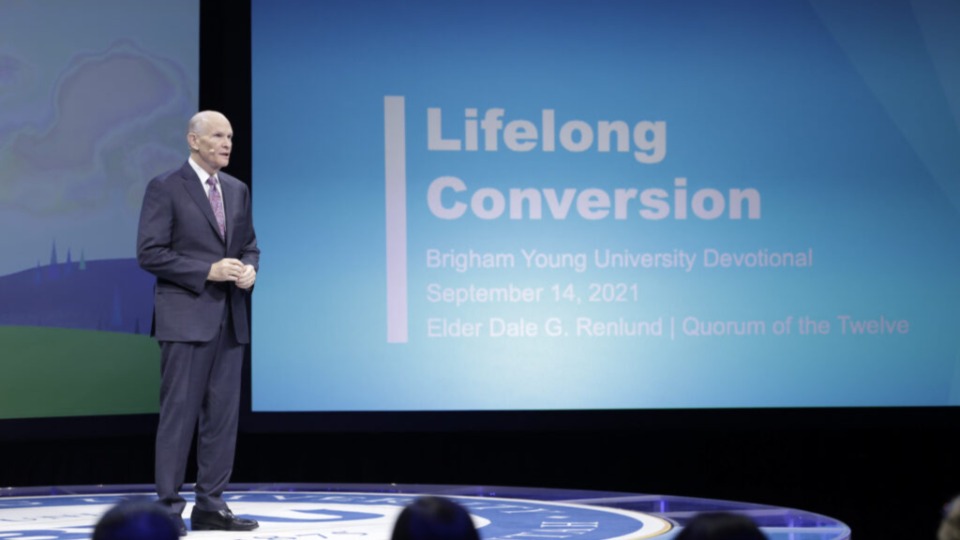
This story appears here courtesy of TheChurchNews.com. It is not for use by other media.
By Rachel Sterzer Gibson, Church News
In general conference leadership meetings last April, then-Primary General President Joy D. Jones led a discussion with children, including a girl named Charlotte Nance.
When President Jones asked Charlotte about being baptized, Charlotte responded, “I felt really, really happy, because, well, I just got baptized. Now, I could keep being happy and be a member of the Church and get a testimony and as some would say, live happily ever after, but it’s not that simple.”
Everyone wants to live happily ever after, Elder Dale G. Renlund commented after sharing the above scenario during his Brigham Young University campus devotional address on Tuesday, September, 14. “But, as we learned from Sister Nance and Sister Jones, it is not that simple and there is a little bit of work involved.”
So how can individuals live “happily ever after”? the Apostle asked. “The road to eternal happiness depends on lifelong conversion to the truths of the restored gospel of Jesus Christ. Lifelong conversion means that we endure to the end, remaining firm in our commitment to keep the covenants we have made with God — no matter what.”
Speaking to students and faculty from the Marriott Center on the Provo, Utah, campus, the member of the Quorum of the Twelve Apostles addressed the topic of “lifelong conversion” and explained that the best way to become a lifelong convert is to engage with the doctrine of Christ.

The doctrine of Christ — faith in the Savior and His Atonement, repentance, baptism and receiving the gift of the Holy Ghost — is not intended to be a one-time event, he said, but to be repeated and iterative.
“‘Repeatedly’ means that we cycle through the elements in the doctrine of Christ throughout our lives. ‘Iteratively’ means that we change and improve with each cycle.”
Although the cycle is to be repeated, that does not mean individuals are spinning in circles like on a merry-go-round. Rather, as individuals cycle through the elements of the doctrine of Christ, they arrive at a higher plane each time, like a long road ascending a mountain peak, he explained.

“Each element in the doctrine of Christ builds on the preceding step — repentance builds on faith — baptism on repentance — the gift of the Holy Ghost on baptism, and then the sequence recurs. Each cycle ends progressively higher, so the subsequent cycle is higher and different. In this way, the doctrine of Christ is iterative. Cycling iteratively through the elements of the doctrine of Christ enables us to endure to the end,” Elder Renlund said.
Enduring to the end does not mean completing the first four steps, then hunkering down, gritting one’s teeth and waiting to die. “No, enduring to the end is actively and intentionally repeating the steps in the doctrine of Christ,” he said.
So how does someone who has been baptized repeat that step? Through the sacrament, Elder Renlund explained. “The covenants of baptism are renewed by partaking of the sacrament in remembrance of our Savior and His atoning sacrifice, and the blessings of baptism are also renewed.”
The sacrament is the next ordinance after being confirmed a member of the Church, after receiving the endowment or being sealed in the temple, after making a good choice or making a poor choice. “The sacrament is the next ordinance needed every week for the rest of our lives.”

The sacrament does not replace baptism but provides the link between the initial steps of faith and repentance to the later step of receiving the Holy Ghost, which enables the elements in the doctrine of Christ to be experienced iteratively.
“The sacrament unlocks the power of God for you and me,” Elder Renlund said. However, distractions can diminish this power.
Elder Renlund encouraged listeners to conscientiously prepare for and worthily partake of the sacrament, beginning in the days leading up to sacrament meeting. “Decide what aspect of the Savior’s mission you are going to think about during the sacrament and perhaps consider one thing you can do to increase your faith, change in a positive way — which is another way to say repent — and follow the promptings of the Holy Ghost. … We should pray to be renewed as we partake of the sacrament and remember Him.”
After instituting the sacrament among the Nephites, the Savior commanded them to regularly partake of it (3 Nephi 18:12–13). “Lifelong conversion requires that we access the Holy Ghost, and we do that by focusing on the sacrament throughout our lives. By iteratively claiming the cleansing effect of baptism through the sacrament, our own personal conversion becomes lifelong,” Elder Renlund said.
For the repetitive cycle of the doctrine of Christ to be iterative, the trajectory must be upward. For that to happen, individuals also need to engage with the other elements of the doctrine of Christ: faith and repentance, Elder Renlund said.
Alma encouraged the Zoramites to experiment on the word. Elder Renlund pointed out that, unlike a scientific experiment, this experiment begins by choosing and desiring to believe, without a skeptical or neutral bias. “It treats Christ’s gospel as a seed, planting it, and then acting in faith to nurture it. As the seed grows, not only is faith increased, but we can also know that it is a good seed.”
Knowing that the word, or the doctrine of Christ, is good and true prompts individuals to act in faith, and acting in faith enables faith to grow stronger, Elder Renlund said. “Increasing faith in Jesus Christ naturally leads to repetitive and iterative repentance, which leads to eternal progression. Repentance and lifelong conversion go hand in hand. Repentance is not to be feared. Fearing repentance blocks lifelong conversion because it hinders cycling through the elements of the doctrine of Christ.”

Engaging with each element of the doctrine of Christ iteratively is vital to lifelong conversion, Elder Renlund said. “As we iteratively cycle through the doctrine of Christ, we learn of and develop Christlike attributes. Our faith increases, we become a little better, we are better prepared to partake of the sacrament next Sunday, and the Holy Ghost will have a greater influence in our lives. Our hearts are changed, we have ‘no more disposition to do evil, but to do good continually’ (Mosiah 5:2). We become more outwardly directed and less self-centered. And we can endure to the end.”
Comparing the cycle again to a long mountain road, Elder Renlund noted that there is no place to stop and rest; the course either goes up or down. In a similar way, faith is either becoming stronger or weaker. “That means that you can become ‘unconverted’ at least as easily as you can become ‘converted.’ … The decrease happens if you disengage from the doctrine of Christ,” Elder Renlund warned.
The Finnish word “sisu” has been described as meaning determination, tenacity of purpose, resilience and hardiness. Sisu expresses a characteristic that manifests itself in displaying grit, resolve and courage in the face of extreme adversity.
“Sisu is the type of determination we need to stay on the covenant path. With spiritual sisu, we are committed to conscientiously prepare for and worthily partake of the sacrament every week,” Elder Renlund said.
Spiritual sisu is not conditioned on circumstances or opposition, he continued. With spiritual sisu, individuals are spiritually resilient and better able to withstand challenges without falling or faltering.
With spiritual sisu, individuals seek to receive a fullness of the Holy Ghost, speedily repent and return to the covenant path, engage with the doctrine of Christ and fulfill the covenant to live the law of the gospel.
Elder Renlund concluded, “Young Sister Charlotte Nance was right: To live happily ever after is not that simple. But it is also not really that complicated either. As we engage with the doctrine of Christ, we develop spiritual sisu, the spiritual resilience that is essential to lifelong conversion.”
Copyright 2021 Deseret News Publishing Company